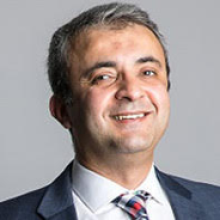CEE Seminar: Sensitivity Analysis of the IDEAL-CT Test Using the Discrete Element Method

Professor
College of Engineering
California State University, Long Beach
Abstract: Cracking of asphalt concrete (AC) is considered a primary mode of failure, which is why studying the fracture behavior of AC is an important step toward finding an effective way to enhance its cracking resistance. For this purpose, the development of the indirect tensile cracking laboratory test (IDEAL-CT) was used to assess the cracking behavior of asphalt concrete. The IDEAL-CT, which has recently been accredited by ASTM (2016), is one of the innovative ways to assess cracking tendencies by defining a unique index capable of sorting mixes’ cracking resistance. Sensitivity of the test results to the test parameters is needed to monitor the test’s performance. Several parameters impact the result of the IDEAL-CT. This study focuses on the variation of air voids, loading rate, aggregate shape, bonding type and gradation mix. Examining all these parameters would be cumbersome using traditional statistical techniques, as they require a high number of samples. The Plackett-Burman method (PB) was employed to conduct the ruggedness test while reducing the number of tests required. Performing a total of 32 PB scenarios would require considerable resources and time. To solve the issue, the particle flow code in two-dimension software using the discrete element method is adapted to defer the need for an actual laboratory test for each scenario. Initial findings yielded a better understanding of each mix's micromechanical behavior, showing that air void content has more impact than loading rate. Additionally, different aggregate sources and different bonding strengths affected the mixes’ cracking resistance.
Bio: Shadi Saadeh is a professor of civil engineering at California State University, Long Beach, where he has served as a faculty member since 2007. Saadeh worked for Texas Transportation Institute, 2003-2005, and the Louisiana Transportation Research Center from 2006-2007. He received his bachelor's degree in civil engineering from the University of Jordan (1997), master's degree in civil engineering from Washington State University (2002), and doctorate in civil engineering from Texas A & M University (2005).
Saadeh’s research focuses on topics directly related to granular materials, including asphalt mixes and its constituents. His main research areas are constitutive modeling of highway materials at the microstructural level, preservation technologies, sustainability and life-cycle assessment, performance of highway infrastructure, experimental characterization of highway materials using X-ray computed tomography, image analysis techniques and mechanical testing.
Saadeh is the director of the National Center for Transportation Green Technology and Education (TransGet) at CSULB. He has received several research and scholarly awards. He is an associate editor of the Journal of Materials in Civil Engineering, an author and reviewer for many scientific journals such as the Journal of Transportation Research Board, the American Society for Testing and Materials, the Journal of the American Society for Civil Engineers, Journal of the Association of Asphalt Paving Technologists and Journal of Computational Materials Science.
Share
Upcoming Events
-
MAE 298 SEMINAR: Europa Clipper Mission Design
-
CBE 298 Seminar: Metal Electrodeposition for Modern Mineral Refining
-
MSE 298 Seminar: Quasi-1D/2D Charge-Density-Wave Materials - From Exotic Physics to Application Prospects
-
EECS Seminar: Steering Diffusion Models for Generative AI, From Multimodal Priors to Test-Time Scaling
-
CBE 298 Seminar: Finding Catalysts of Gut Reactions - The Gut Microbiota in Disease Onset and Treatment
